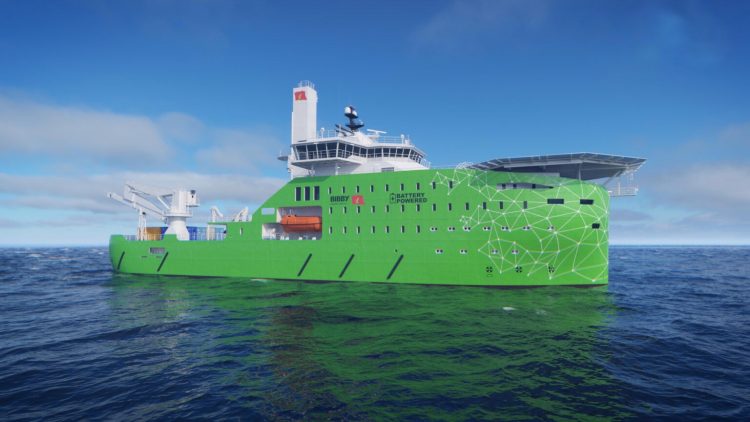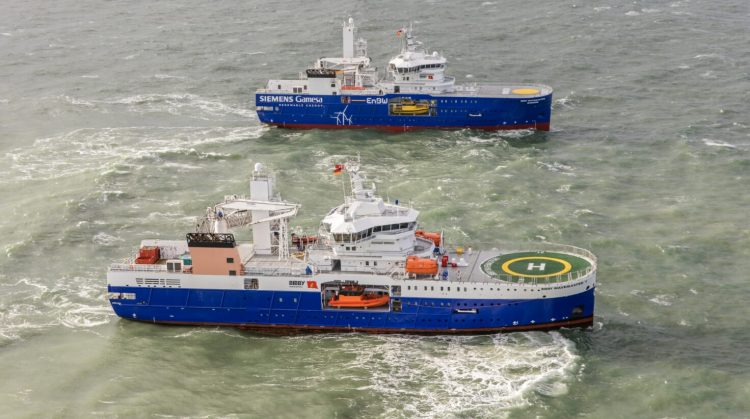Costing tens of millions of pounds Liverpool firm Bibby Marine is building the world’s first zero-emission offshore wind farm support vessel – now it says it intends to build another three. Tony McDonough reports

Liverpool maritime specialist Bibby Marine says the zero-emission offshore wind farm support vessel it is currently building will be the first of several.
Costing tens of millions of pounds, and backed by the UK Government, the electric commissioning service operation vessel (eCSOV) will feature a battery system complemented by dual-fuel methanol engines.
A division of Bibby Line Group, one of Liverpool’s oldest family firms, Bibby Marine has led a consortium developing its groundbreaking maintenance vessel for several years. In September 2023 it secured £20m from the Government to support the project.
Although it hasn’t revealed the cost of the eCSOV previous estimates have put the figure at between £40m and £50m. This new vessel is being built by Armon, which is located in Vigo in Spain.
In an interview with the Maritime Journal, eCSOV project director Gavin Forward says the vessel will be the first of at least three with the company planning to create a fleet of electric ships which it aims to put out tenders for.
“The Government funding bridged that gap, and the next three will be a revised version where we’ve taken down the price while still maintaining pretty much the same operability but at a reduced price by reducing some of the equipment specifications, which means we’re more competitive,” said Gavin.
Bibby currently has two offshore support vessels servicing wind farms – Wavemaster Horizon and Wavemaster 1 – which are powered by conventional diesel fuel.
They are floating powerhouses that provide support for offshore facilities such as wind farms and gas and oil fields. They carry up to 90 people for weeks at a time and they have huge power needs.
Each vessel generates 6-7 MW of power. In a year both vessels will use enough energy to power 800 homes and 18m miles of car journeys. It adds up to 14,000 tonnes of CO2.
Once in operation Bibby says the eCSOV, which will support offshore installations such as windfarms, will have the capability to operate solely on battery power for a typical full day of operations, the range of the vessel will allow for passage from field to port and return.
Saving thousands of tonnes of CO2 over its lifetime the vessel will allow Bibby to slash operation costs. It has been designed in collaboration with the UK-based Longitude.
“We’ve modelled our new vessel on the existing ones, but it’s essentially a completely off-the-ground design, a purpose-built vessel for the offshore wind market, a zero-emission, dedicated battery vessel,” added Gavin.
“We’ve got a large battery pack, a 25MWh battery pack, that gives us a full day’s operation on the battery, modelled on the existing fleet and the operations they do.
“We looked at how many connections we’d make to a gangway each day, how far we’d transit in the field between turbines, how long we’d need to charge, and we modelled the battery based on that.
“We realised we would need around 16 MWh of power per day, which then led us to the battery size of 25MWh to give us the required lifespan plus a bit of extra contingency.
“We charge it overnight for five to six hours off a wind turbine charging system, and we can sail between 100 and 130 nautical miles on the battery – depending obviously on the weather conditions. The higher the sea state, the less time we have.”

He also said: “We see that in future iterations, maybe 10 years down the line, you could operate a vessel just on the battery for this market.
“But because we don’t have guaranteed offshore charging, or shore charging, we’ve had to be flexible, and that’s why we’re delivering a vessel with dual-fuel engines – green methanol if it’s available.”
But for such vessels to become commonplace offshore charging will have to become widely available, said Gavin. He explained: “I think the biggest hurdle is Governmental and commercial, the drive from the industry to put the equipment into the turbines.
“It’s not technical – technically and practically, everything can be done, the technology’s there, it’s proven technology, the designs that they’ve got on the table, they’re all class approved, ready to go.
“So if the Crown Estate said that all new wind farms on the UK continental shelf should have offshore chargers, then this is what would drive the industry to change to electrification because the technology’s there.”
The post Bibby Marine to build fleet of electric wind farm ships appeared first on Liverpool Business News.





